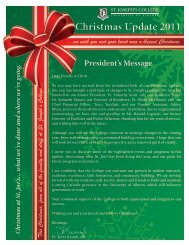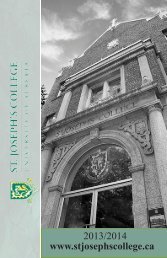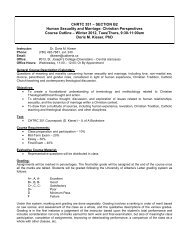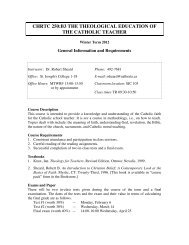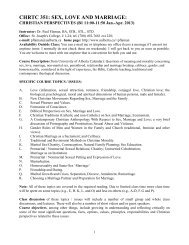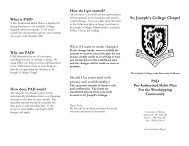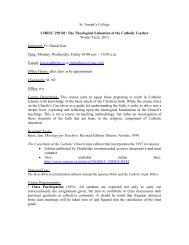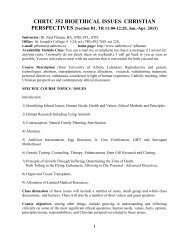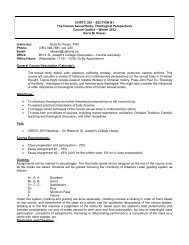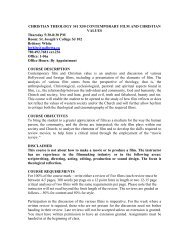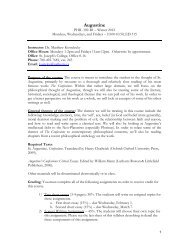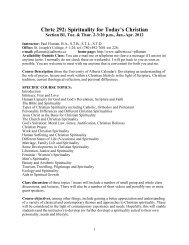phil 339 (x50) - St. Joseph's College - University of Alberta
phil 339 (x50) - St. Joseph's College - University of Alberta
phil 339 (x50) - St. Joseph's College - University of Alberta
Create successful ePaper yourself
Turn your PDF publications into a flip-book with our unique Google optimized e-Paper software.
THE UNIVERSITY OF ALBERTA<br />
ST. JOSEPH'S COLLEGE<br />
Joseph A. Buijs<br />
<strong>St</strong>. <strong>Joseph's</strong> <strong>College</strong><br />
Email: jbuijs@ualberta.ca Phone: 780-492-7681<br />
For detailed information see: http://www.ualberta.ca/~jbuijs/<strong>phil</strong><strong>339</strong>.htm<br />
PHIL <strong>339</strong> (X50)<br />
CONTEMPORARY WORLD VIEWS<br />
AND CHRISTIANITY<br />
WINTER TERM (II) 2013 Course Reg # 72264<br />
W: 18:00 - 21:00 Classroom: SJ 102<br />
DESCRIPTION<br />
Critical study <strong>of</strong> Christianity in dialogue with such worldviews as atheism,<br />
agnosticism, naturalism, materialism, existentialism, feminism, liberalism, and<br />
postmodernism.<br />
OBJECTIVES<br />
The overall objectives <strong>of</strong> this course are:<br />
# To explore diverse and contemporary worldviews in<br />
relation to the worldview <strong>of</strong> (christian) theism.<br />
# To assess the compatibility, or conflict, among underlying<br />
assumptions <strong>of</strong> selected worldviews.<br />
# To gain an understanding <strong>of</strong> the <strong>phil</strong>osophical issue <strong>of</strong><br />
faith vs reason in a contemporary context.<br />
“Policy about course outlines can be found in Section 23.4(2) <strong>of</strong> the <strong>University</strong> Calendar.”<br />
(<strong>University</strong> Calendar, Addendum Page, June 13, 2012: 23.4 (2)(a)(xi))
JA Buijs Phil <strong>339</strong>, 2013 – 2<br />
RESOURCES<br />
Joseph A. Buijs. Worldviews in Conflict and Dialogue. Published for <strong>St</strong>udent Use.<br />
<strong>University</strong> <strong>of</strong> <strong>Alberta</strong>, 2013.<br />
Selected Readings and Resources for Phil <strong>339</strong>. Compiled by Joseph A. Buijs. <strong>University</strong><br />
<strong>of</strong> <strong>Alberta</strong> Custom Courseware, 2013.<br />
Joseph A. Buijs, What is Philosophy? A Guide for the Beginning <strong>St</strong>udent. Published for<br />
<strong>St</strong>udent Use. <strong>University</strong> <strong>of</strong> <strong>Alberta</strong>, 2003.<br />
<strong>St</strong>udents will have access to an eClass site with detailed information on topics,<br />
assignments, marking, additional resources, <strong>of</strong>fice hours, and the like.<br />
EXPECTATIONS (Workload)<br />
In addition to a reflective and critical study <strong>of</strong> required reading material, students will be<br />
expected to complete the following written work:<br />
# Two take-home tests, answering a pre-assigned question<br />
maximum three typed pages; 15% each.<br />
# A critical discussion <strong>of</strong> any selected conceptual framework (religion, ideology,<br />
<strong>phil</strong>osophy, worldview) other than any <strong>of</strong> the six explored in the course<br />
outline: 5%<br />
maximum eight typed pages; 25%<br />
# A final, take-home exam: 40%<br />
Written work is expected to be the student’s own and specifically produced for this course. Any<br />
use <strong>of</strong> resources, whether merely drawing from the views and arguments <strong>of</strong> others or quoting<br />
verbatim, must be properly documented.<br />
“The <strong>University</strong> <strong>of</strong> <strong>Alberta</strong> is committed to the highest standards <strong>of</strong> academic integrity and<br />
honesty. <strong>St</strong>udents are expected to be familiar with these standards regarding academic honesty<br />
and to uphold the policies <strong>of</strong> the <strong>University</strong> in this respect. <strong>St</strong>udents are particularly urged to<br />
familiarize themselves with the provision <strong>of</strong> the Code <strong>of</strong> <strong>St</strong>udent Behaviour (online at<br />
www.ualberta.ca/secretariat/appeals.htm) and avoid any behaviour which could potentially result<br />
in suspicions <strong>of</strong> cheating, plagiarism, misrepresentation <strong>of</strong> facts and/or participation in an<br />
<strong>of</strong>fence. Academic dishonesty is a serious <strong>of</strong>fence and can result in suspension or expulsion from<br />
the <strong>University</strong>.” (<strong>University</strong> Calendar, Addendum Page, June 13, 2012: 23.4 (2)(a)(xii))<br />
“Whether we know it or not--whether we like it or not – each <strong>of</strong> us has a worldview.<br />
These worldviews function as interpretive conceptual schemes to explain why we "see"<br />
the world as we do, why we <strong>of</strong>ten think and act as we do. Competing worldviews <strong>of</strong>ten<br />
come into conflict.”<br />
Ronald H. Nash, Faith and Reason (1988): 33-34
JA Buijs Phil <strong>339</strong>, 2013 – 3<br />
PROGRAMME OF STUDY<br />
The course will lead students through a critical discussion <strong>of</strong> the following themes. Worldviews<br />
in Conflict And Dialogue and additional resources discuss each <strong>of</strong> these themes and worldviews.<br />
Worldview: the concept, structure and significance<br />
What is a worldview? How is it different from ideologies? What is the structure and significance <strong>of</strong> a<br />
worldview among our belief-systems? What are some examples <strong>of</strong> conflicting worldviews? How do we assess<br />
worldviews? How can we address conflicting worldviews? What is my worldview?<br />
Religious worldviews: Christian Theism<br />
What is fundamental to a Christian worldview?<br />
How does Christianity view the world, the nature <strong>of</strong> human<br />
beings, the meaning and purpose <strong>of</strong> human life? How does<br />
Christianity view the limits or extent <strong>of</strong> human knowledge?<br />
What is the basis, or justification, for these views? What is<br />
<strong>phil</strong>osophically plausible about Christian theism? What, if<br />
antyhing, is <strong>phil</strong>osophically problematic?<br />
“Perhaps there are four billion worldviews, since<br />
every person has her or his set <strong>of</strong> values and<br />
perspective on life. But there are also major<br />
patterns and systems which shape and are shaped<br />
by societies, and we give to these such labels as<br />
‘Christianity’ and ‘Buddhism’.”<br />
Ninian Smart, Buddhism and<br />
Christianity: Rivals and Allies (1993): 1<br />
Religious worldviews: Buddhism<br />
What is fundamental to a Buddhist worldview? How does Buddhism view the world and human life within<br />
it? What is the basis, or justification, for these Buddhist views? What is <strong>phil</strong>osophically plausible, or problematic,<br />
about Buddhism? How does a Buddhist view compare, or contrast, with a Christian view <strong>of</strong> reality, human nature,<br />
knowledge?<br />
“. . . at least among Western-influenced peoples,<br />
Christian theism and naturalistic or secular<br />
humanism are the primary options <strong>of</strong> the day.”<br />
Arthur F. Holmes,<br />
Contours <strong>of</strong> a World View (1983): 15<br />
Humanism: values and purpose<br />
What is the fundamental focus <strong>of</strong> humanism?<br />
What is the basis <strong>of</strong> value and meaning in human life?<br />
Is “man the measure <strong>of</strong> all things”? What is<br />
<strong>phil</strong>osophically plausible in humanism? What, if<br />
anything, is problematic? Are humanism and its<br />
varieties compatible with Buddhism? Is a christian<br />
humanism possible? In what sense or to what extent?
JA Buijs Phil <strong>339</strong>, 2013 – 4<br />
Naturalism: science and the world<br />
What is fundamental to a naturalistic worldview?<br />
What are its ontological, epistemological, and ethical<br />
views? How can we adequately explain the moral<br />
dimension <strong>of</strong> human beings? Their mental capacities and<br />
experience <strong>of</strong> consciousness? What are the legitimate<br />
scope and limits <strong>of</strong> science? Must naturalism be<br />
necessarily materialistic? Must naturalism be non-theistic?<br />
What is <strong>phil</strong>osophically plausible in naturalism? What, if<br />
anything, is problematic?<br />
“. . . one theme that underlies nearly all<br />
<strong>phil</strong>osophical discussion is the perpetual conflict<br />
between naturalistic and nonnaturalistic world<br />
views.”<br />
William H. Halverson, A Concise<br />
th<br />
Introduction to Philosophy (4 ed.,<br />
1981:): 9<br />
Postmodernism: meaning and interpretation<br />
“Postmodernism swims, even wallows,<br />
in the fragmentary and the chaotic<br />
currents <strong>of</strong> change as if that is all there<br />
is.”<br />
David Harvey, The Condition<br />
<strong>of</strong> Postmodernity (1989): 44<br />
What are the origins <strong>of</strong> postmodernism? What are the<br />
fundamental contentions <strong>of</strong> postmodernism? How does<br />
postmodernism understand meaning, truth, reality? Is reality<br />
merely a human construct? Is truth made rather than discovered? Is<br />
morality conventional rather than universal? What is<br />
<strong>phil</strong>osophically plausible in postmodernism? What, if anything, is<br />
problematic? Is a christian postmodernism or a buddhist<br />
postmodernism possible?<br />
Atheism (agnosticism)<br />
On what basis is atheism or non-theism<br />
opposed to theism? Are there significant varieties <strong>of</strong><br />
non-theism or atheism? What justification can be<br />
given for a non-theistic worldview? How does this<br />
worldview address the issue <strong>of</strong> meaning or purpose in<br />
life? What is <strong>phil</strong>osophically plausible in atheism or<br />
non-theism? What, if anything, is problematic? Is any<br />
fruitful dialogue possible between theists and nontheists?<br />
“. . . for somebody living in the twentieth century<br />
with a good <strong>phil</strong>osophical and a good scientific<br />
education, who thinks carefully about the matter,<br />
for such a person it is irrational to believe in God.”<br />
Kai Nielsen, Does God Exist, The Great<br />
Debate (1990): 48<br />
“People who share one <strong>of</strong> these [four<br />
distinguishable worldviews <strong>of</strong> Western societies]<br />
communicate fairly well with one another, not so<br />
well with people <strong>of</strong> a different worldview.”<br />
Walter T. Anderson, “Four Ways to be<br />
Absolutely Right,” The Truth about the<br />
Truth (1995): 110<br />
Competing worldviews: conflict or<br />
convergence?<br />
How can we address the issue <strong>of</strong> pluralism<br />
among worldviews? Is conflict inevitable? Is<br />
convergence possible? What are some <strong>of</strong> the parameters<br />
for constructive dialogue among conflicting worldviews?<br />
Can faith commitments be integrated into intellectual<br />
pursuits?
JA Buijs Phil <strong>339</strong>, 2013 – 5<br />
CONTACTING THE INSTRUCTOR<br />
The easiest way to contact me with course concerns is by email (place Phil <strong>339</strong> in the<br />
subject heading). However, arrangements can be made to meet at any other convenient time as<br />
needed. Usually, I can also stop to address concerns or questions immediately after class.<br />
USE OF COURSE CONTENT<br />
Printed course material and additional on-line resources are under copyright protection.<br />
They are made available for personal use only.<br />
“Audio or video recording <strong>of</strong> lectures, labs, seminars or any other teaching environment by<br />
students is allowed only with the prior written consent <strong>of</strong> the instructor or as a part <strong>of</strong> an<br />
approved accommodation plan. Recorded material is to be used solely for personal study, and is<br />
not to be used or distributed for any other purpose without prior written consent from the<br />
instructor.” (<strong>University</strong> Calendar, Addendum Page, June 13, 2012: 23.4 (2)(e))<br />
TAKE-HOME TESTS<br />
DUE January 23, 2013<br />
March 6, 2013<br />
March 20, 2013 (optional)<br />
VALUE<br />
OBJECTIVE<br />
LENGTH<br />
CONTENT<br />
APPROACH<br />
30% <strong>of</strong> the term mark (15% each)<br />
To show a critical understanding <strong>of</strong> a worldview and<br />
implied <strong>phil</strong>osophical issues.<br />
No more than 3 pages (computer print-out, double-spaced,<br />
12-point font).<br />
Each test will consist <strong>of</strong> answering an assigned question in<br />
relation to issues and worldviews discussed up to that point.<br />
No further research or reading should be required, other<br />
than the resources <strong>of</strong> the course, i.e., class discussion, notes,<br />
and assigned selections from the Coursepack.
JA Buijs Phil <strong>339</strong>, 2013 – 6<br />
PHILOSOPHICAL (RESEARCH) PROJECT<br />
DUE Outline: February 13, 2013. Project: March 27, 2013<br />
VALUE<br />
OBJECTIVE<br />
LENGTH<br />
SCOPE<br />
<br />
30% <strong>of</strong> the term mark (5% for the outline; 25% for the essay)<br />
To develop critical <strong>phil</strong>osophical thinking dealing with a conceptual<br />
framework or worldview<br />
No more than 8 pages (computer print-out, double-spaced, 12-point<br />
font)<br />
Select any conceptual framework: religion, ideology, <strong>phil</strong>osophy, or<br />
worldview, other than the six already contained in the Coursepack.<br />
Include the following components:<br />
! Introduction: some background, historical context, influences,<br />
personages (as applicable)<br />
! Fundamental claims: touchstone belief and/or view <strong>of</strong> reality,<br />
truth, knowledge, human nature, and the like<br />
! Comparison and contrast: relation <strong>of</strong> chosen conceptual<br />
framework to one <strong>of</strong> the Coursepack worldviews; in what ways it is<br />
similar or different, whether it is a modification, an extension, or a<br />
reaction<br />
! Critical assessment: what is plausible, what remains problematic<br />
! Resources: at least one reference to a Coursepack selection and one<br />
reference to some other resource.<br />
ASSESSMENT<br />
FURTHER<br />
HELP<br />
The Research Project will be assessed using the following criteria:<br />
! Elements <strong>of</strong> style that include spelling, diction, grammar,<br />
documentation<br />
! Clarity in presenting concepts, claims, views<br />
! Cogency in presenting argumentation or justifications<br />
! Critical response that shows your stand towards the conceptual<br />
framework – whether definite or qualified – and that defends it as<br />
best you can.<br />
In choosing a conceptual framework, select one with which you are<br />
already somewhat familiar or one that you would like to pursue further.<br />
Suggested resources are under ASSIGNMENT on WebCT. Sample<br />
references and suggestions on developing a critical, <strong>phil</strong>osophical<br />
approach are also available on WebCT under RESOURCES and in<br />
What is Philosophy?
JA Buijs Phil <strong>339</strong>, 2013 – 7<br />
FINAL EXAM<br />
General Information<br />
The Final Exam in this course will be a take-home exam. It will be distributed in class on<br />
April 3 and will be due April 10 prior to 7:00 pm. The content <strong>of</strong> the exam will be chosen from a<br />
list <strong>of</strong> questions made available on-line, excluding those that were assigned for the earlier takehome<br />
tests.<br />
If for any reason, medical or otherwise, a student is unable to hand in the final exam by<br />
the scheduled time, notify your instructor as soon as possible.<br />
Requests for deferrals and re-examinations follow the policy as set by the Faculty <strong>of</strong> Arts;<br />
see sections 23.5.5 <strong>of</strong> the <strong>University</strong> <strong>of</strong> <strong>Alberta</strong> Calendar.<br />
Format<br />
Since the exam is for a course in <strong>phil</strong>osophy, it will test for <strong>phil</strong>osophical understanding and<br />
<strong>phil</strong>osophical thinking, more than for memorized information. The exam will consist <strong>of</strong> several<br />
sections with a choice within each section. The types <strong>of</strong> questions vary from a critical discussion<br />
<strong>of</strong> a broad theme covered in the course, to more specific issues from within a single unit, to a<br />
clarification <strong>of</strong> concepts together with their <strong>phil</strong>osophical significance.<br />
MARKING AND GRADING<br />
Philosophical writing strives for clarity, conciseness, coherence, critical insight, and<br />
cogency. Thus written assignments will be evaluated using those criteria, modified somewhat to<br />
suit the scope <strong>of</strong> specific assignments.<br />
The marks for individual components <strong>of</strong> the course are weighted according to the<br />
percentage assigned to them for the course, giving a total raw score based on 100%, and then<br />
converted into a grade for the course according to a conversion scale..<br />
However, the conversion scale is only “a rough mathematical guideline”. The assignment<br />
<strong>of</strong> a course grades may include, in addition to raw scores for written assignments and the final<br />
exam, such other qualitative considerations as overall class performance, individual improvement<br />
and class participation. Although individual grades will not be determined on the basis <strong>of</strong> a<br />
preassigned distribution, historical Grade Point Averages for courses in the Faculty <strong>of</strong> Arts may<br />
be used to adjust the conversion scale with the effect <strong>of</strong> raising, rather than lowering, individual<br />
grades.<br />
For more detailed information on evaluation criteria for written work, raw marks, and<br />
conversion scale from percent to a grade for the course see the document “Marking” on eClass<br />
under General Information or under Assignments.



